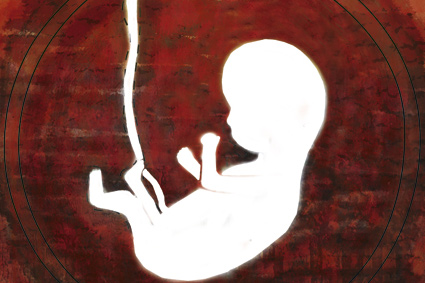PCOS and Miscarriage
Miscarriage Symptoms
The first symptoms may be vaginal bleeding or discharge, sometimes accompanied by abdominal pain or backache. Vaginal bleeding in early pregnancy is called "threatened miscarriage", but doesn't necessarily develop into an actual miscarriage. Many women will go on to have a normal pregnancy.
Additional early signs are that you may notice that pregnancy symptoms such as nausea or sore breasts disappear, whether or not there is bleeding. Or, you may not have any bleeding or any other sign that something is wrong, but discover that your pregnancy has ended only during a routine antenatal scan. This is called a "missed miscarriage" or "delayed miscarriage".
Another but less common symptom is severe and sharp or one-sided abdominal pain. In this case, you may have an ectopic pregnancy, which develops outside of your womb. Anytime you have severe abdominal pain, contact your physician immediately or go to the nearest emergency room.
How Common Is Miscarriage ?
Estimates of the incidence of miscarriage vary, because women have miscarriages without even knowing that they are pregnant. However, some health authorities estimate that one pregnancy in four ends in miscarriage, mostly in the first 12 weeks of pregnancy.
The miscarriage rate appears to be higher for women with polycystic ovarian syndrome (PCOS). Some studies suggest that the rate could be 45% or more.
Causes of Miscarriage
There are multiple possible causes of miscarriage. Although not all the possible causes have been identified, the main causes are thought to be:
Genetic
Perhaps half of all early miscarriages occur because of chance chromosomal abnormalities. Chromosomes carry the genes that hold the keys to your baby's traits. Most chromosomal abnormalities result from a defective egg or sperm, which produces an embryo with the wrong number of chromosomes or a chromosomal defect. These embryos often fail to thrive and the pregnancy miscarries.
Immunological
German measles or an infection accompanied by a very high fever may lead to miscarriage. Women with a bacterial vaginal infection have a significantly greater risk of miscarriage in the second trimester of pregnancy.
Some women may have an inherited tendency to produce immune system antibodies that cause an excessive tendency to form blood clots, which can block circulation to the developing fetus. Women with these blood coagulation disorders have more miscarriages and pregnancy problems than other women.
Anatomical
If your cervix (neck of the uterus) is weak, it may start to open as the uterus becomes heavier in later pregnancy and this could lead to later miscarriage. An irregular-shaped uterus may not allow enough room for your baby to grow. Large fibroids in your uterus may cause miscarriage in later pregnancy.
Lifestyle
More than two alcoholic drinks a day may increase risk of miscarriage. Smoking is a clear risk for miscarriage, premature birth, and low birth weight.
Diet
Some studies have suggested that coffee or caffeine may increase rates of miscarriage.
What you eat can also affect your pregnancy outcome. One recent study has shown that women with low folic acid levels were 50% more likely to have a miscarriage than women with high levels. Folic acid is a B vitamin found most commonly in leafy green vegetables. Low zinc has also been associated with miscarriage. These studies imply that a poor-quality diet may be a contributor to miscarriage.
Eating a diet a low-fiber diet that is also high in refined carbohydrates and other processed foods will disturb your hormonal balance and could contribute to a higher risk of miscarriage. In particular, you want to avoid sweets and refined flour products, since these foods cause excessive increases in insulin.
Lifestyle
More than two alcoholic drinks a day may increase risk of miscarriage. Smoking is a clear risk for miscarriage, premature birth, and low birth weight.
Environmental Pollution
Chemical compounds are everywhere in our food, water and air. Every person is a "bioaccumulator" of these chemicals. Some of these chemicals are hormone mimics or hormone disrupters. Others are just plain toxic. Women with high blood levels of a class of chemicals called "organochlorine compounds", have problems with infertility, stillbirths, and miscarriages.
There's no question that you have environmental chemicals in your fat tissue. The only question is what concentrations of chemicals do you have, and what effect are they having ?
Hormonal
Women with hormonal irregularities may find it harder to conceive and when they do, they appear more likely to miscarry. A dominant feature of women with polycystic ovary syndrome (PCOS) is that they are likely to have multiple hormonal imbalances -- some are too high while others are too low.
Luteal phase defect.
The luteal phase is the second half of the period, the time between ovulation and onset of the next menses. A luteal phase defect is essentially a failure of the uterine lining to be in the right phase of development at the right time, thus preventing implantation of the fertilized egg, or making the embryo's attachment to the uterus precarious.

A luteal phase defect may occur at several points during a menstrual cycle. It's thought that most luteal phase defects originate in the follicular phase of your cycle, before ovulation.
During the follicular phase, your body may not produce enough FSH (follicle stimulating hormone), or your ovaries have a weak response to FSH. The consequence is inadequate follicle development. After the follicle releases its egg, it converts itself into a different structure called the corpus luteum.
The corpus luteum produces the progesterone needed to thicken the lining of your uterus and stimulate development of additional blood vessels, which provide a place for your embryo to attach and to grow.
However, poor follicle formation will lead to a poor quality corpus luteum, and thus the corpus luteum is less likely to secrete the amount of progesterone required to ensure that the uterus can support the development of your embryo.
A luteal phase defect may also be caused by excessive levels of LH (luteinizing hormone) too early in the menstrual cycle, or an improperly timed LH surge.
LH (luteinizing hormone) hypersecretion
Some women with PCOS have elevated LH during the follicular phase (first half of the cycle), which prematurely sends a signal to the egg that it is about to be released from its follicle. The egg then prematurely disconnects from its supporting cumulus cells, which causes the egg to pause in its maturation process.
It is thought that this interruption in the normal maturation process may result in abnormal chromosomes in the egg, which would then substantially increase the probability of a miscarriage.
Other Hormones
Of course, other hormonal imbalances besides FSH and LH may be involved.
Women who miscarry appear to have higher levels of testosterone and DHEA than women with continuing pregnancies.
Women who miscarry may tend to have higher prolactin and androgen levels during the follicular phase of their menstrual cycle.
Insulin and insulin resistance.
Some women with polycystic ovarian syndrome have insulin resistance, where an excessive amount of insulin is required to control blood sugar levels. High insulin levels stimulates further production of LH and testosterone. Excessive levels of insulin, LH and testosterone are associated with poorer egg quality, thus increasing the risk of miscarriage. Insulin resistance has been linked to recurrent pregnancy loss.
As you can begin to see, the risk of miscarriage may be increased by a complex, interacting web of hormones that are out of balance.
Diagnosis

An ultrasound scan is the most reliable way of diagnosing miscarriage, but a pregnancy test (blood or urine) and clinical examination are also ways to establish what has happened.
As you can begin to see, the risk of miscarriage may be increased by a complex, interacting web of hormones that are out of balance.
Treatment
There is no effective treatment to stop an early miscarriage that is already happening. However, once it is inevitable, there may be choices about managing it.
Unless you have miscarried completely, you may be offered a minor operation (a D&C). You can usually able to go home within a few hours. You may be asked if you would prefer to let nature take its course and wait for the pregnancy to spontaneously end.
Prevention - Natural Therapies
We believe that the best "treatment" for miscarriage is prevention. By prevention, we mean getting much healthier and attempting to get your hormones into balance before you plan to become pregnant. Here are some steps you can take:
1) A healthy diet
A healthy diet means eating foods that are whole, fresh, and organic. Minimize consumption of refined, processed or fabricated foods. Minimize fast foods. Emphasize vegetables, fruits, nuts, seeds and legumes. Preferred animal proteins are fish and poultry. What you eat has a profound effect on your hormones.
2) Exercise and be physically active
Exercise helps you to lose weight and balance your insulin and testosterone levels.
3) Clean up your insides
Consider a physician-supervised cleansing diet or other procedures designed to remove any accumulated toxic material from your body. Naturopathic physicians specialize in safe, effective detoxification protocols.
You've probably been exposed to all sorts of petrochemicals, heavy metals and other contaminants over your lifetime. Bear in mind that some of these substances can reside in your body for a long time, and some of them act as hormone mimics or disrupters. Most of the chemicals you've been exposed to have not been evaluated for their effect on fertility and pregnancy. Some of them may influence your risk of miscarriage.
Other accumulated but undesirable materials may include pathogenic microorganisms, inflammatory food particles, or various byproducts of normal metabolism.
To further explore the issue of removing toxic substances from your body, consult with a licensed naturopathic or other qualified physician.
4) Clean up your environment.
Do what you can to remove toxic materials from your personal and work environment. Environmental pollution and workplace exposure to chemicals adversely affects your fertility and your health.
5) Find ways to deal with stress.
Chronic stress increases cortisol, which is a stress-response hormone. Elevated cortisol is associated with insulin resistance and increased abdominal fat. Obesity appears to be a risk factor for miscarriage.
6) Use nutritional supplements
Food surveys conducted by the U.S. Dept. of Agriculture and other agencies consistently show that Americans consume a diet that is deficient in essential nutrients. Therefore, nutritional supplementation is indicated. Supplementation should contribute to your overall health, help you to balance your hormones, and to have a healthier baby if you become pregnant. For example, studies have suggested that vitamin E may reduce the risk of miscarriage.
8) Consider herbal medicines
Herbal medicines have been used for centuries to aid reproduction. For example, black haw root and false unicorn root may help to reduce miscarriage risk. However, we do not recommend that you self-prescribe herbal medicines. You will get better results if you consult with a licensed naturopathic physician or other certified health practitioner who is trained in herbal medicine.
9) Work with a qualified physician
Your primary goal is to balance your hormones, so that you'll be more likely to have a successful pregnancy. You will need a doctor to help you with this endeavor.